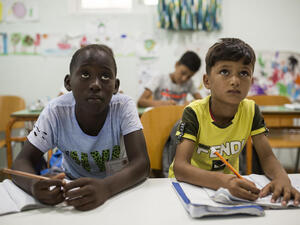UNHCR recommends starting the cessation process for refugees from Croatia
UNHCR recommends starting the cessation process for refugees from Croatia
The UN Refugee Agency is today recommending that the process of ceasing refugee status of refugees displaced from Croatia in the 1990s begins. Almost 20 years after the conflict in the former Yugoslavia ended, the circumstances that triggered displacement have fundamentally changed. Regional cooperation has intensified, voluntary returns have taken place, different ethnic groups have proven able to peacefully co-exist and economic and political progress is increasingly visible.
The cessation clauses are built into the 1951 Refugee Convention. They provide for refugee status to end once fundamental and durable changes have taken place in the country of origin and the circumstances that led to flight no longer exist. Many host countries have also generously granted their citizenship to Croatian refugees. The protection provided by international refugee law is thus no longer required. There are exceptions foreseen in UNHCR's recommendation such as witnesses of war crimes. The cessation of refugee status applies only to refugees and not to those who were internally displaced within their own country.
Host countries can now end refugee status for refugees from Croatia based on their own assessment of the situation in the country of origin. UNHCR has recommended that cessation come into effect by the end of this year. All States hosting refugees from Croatia do have the option to extend until the end of 2017. Today there are 49,056 refugees from Croatia registered in the region, almost all ethnic Serb.
UNHCR is also making recommendations for the further advancement of the Regional Durable Solutions process, to which countries in the region have agreed in order to find solutions for displacement. The process includes the Regional Housing Programme (RHP), which aims to provide housing to 27,000 families of refugees and IDPs in Bosnia and Herzegovina, Croatia, Montenegro and Serbia.
"It is clear that the majority of these refugees from Croatia are no longer in need of international protection, but many still need support. UNHCR has received firm commitments from all participating states and donors that they will continue to remain engaged in the Regional Durable Solutions Process which we welcome," said Vincent Cochetel, Director of UNHCR's Bureau for Europe.
The successful integration of former refugees is a long term process which continues after refugee status has ceased. In the Western Balkans challenges remain for minority groups to access employment, housing, public services and infrastructure aswell as to overcome discrimination. UNHCR remains committed to assist host states to implement the cessation recommendation.
For further information please contact:
- Melita H. Sunjic: [email protected] and +32 472 291 588.
For the full recommendations: http://www.refworld.org/docid/533d813f4.html








